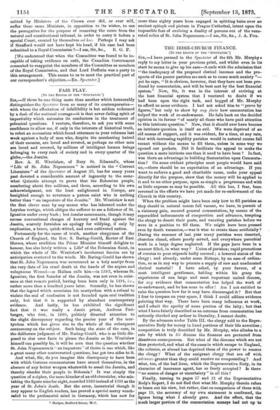FAIR PLAY.
[TO THE EDITOR OF THE "SPECTATOR."]
SIR,—If there be one thing more than another which honourably distinguishes the Spectator from so many of its contemporaries— with whom the affectation of infallibility is but seldom redeemed by a dash of the national courage—it is that never-failing spirit of impartiality which animates its conductors in the treatment of polemical questions. I venture, therefore, to ask you with some confidence to allow me, if only in the interests of historical truth, to rebut an accusation which found utterance in your columns last week against a body of men who, despite the unrelenting hatred of their enemies, are loved and revered, as perhaps no other men are loved and revered, by millions of intelligent human beings belonging to every rank of society and in every quarter of the globe,—the Jesuits.
Rev. A. H. Wratislaw, of Bury St. Edmund's, whose "Life of St. John Nepomucen" is noticed in the " Current Literature" of the Spectator of August 30, has for many years past devoted a considerable amount of ingenuity to the some- what Quixotic attempt to prove that the Bohemian people, numbering about five millions, and these, according to his own acknowledgment, not the least enlightened in Europe, are benighted enough to reverence a patron saint who is nothing better than " an imposture of the Jesuits." Mr. Wratislaw is not the first clever man by any means who has laboured under the Loyolan vertigo, which obliges the sufferer to see a follower of St. Ignatius under every bush ; but insular monomania, though it may excuse conventional charges of knavery and fraud against the Jesuits, scarcely furnishes an apology for vilifying, if only by implication, a brave, quick-witted, and even cultivated nation.
Fortunately for the cause of truth, another clergyman of the Church of England, the Rev. S. Baring-Gould, Rector of East Mersea, whose erudition the Prime Minister himself delights to honour, has also lately written a Life* of the Bohemian Saint, in which the whole of Mr. Wratislaw's incoherent fancies are by anticipation scattered to the winds. Mr. Baring-Gould has shown that St. John Nepomucen was reverenced as a holy martyr from the very date of his cruel death at the hands of the supine and voluptuous Wenzel—as Hallam calls him—in 1393, whereas St. Ignatius, the first founder of the Jesuits, was not even in exist- ence at that remote period, having been born only in 1494, i.e., rather more than a hundred years later. Secondly, he has shown that the legend which associates his martyrdom with a refusal to violate the seal of confession is not founded upon oral tradition only, but that it is supported by abundant contemporary evidence. And lastly, he has exhibited the significant fact that it was really a Jesuit priest, Andreas Frei- berger, who first, in 1680, publicly directed attention to the slight discrepancy regarding the precise year of the mar- tyrdom which has given rise to the whole of the subsequent controversy on the subject. Such being the state of the case, in the deliberate judgment of Mr. Baring-Gould, who is as little dis- posed to slur over facts to please the Jesuits as Mr. Wratislaw himself can possibly be, it will be seen that the question whether St. John Nepomucen is an imposture" of theirs is one which, like a great many other controverted questions, has got two sides to it.
And what, Sir, do you imagine this discrepancy to have been with which German commentators have armed themselves, in the absence of any- better weapon wherewith to assail the Jesuits, and thereby slander their people in Bohemia? It was simply the question of a cipher, the mere blunder of an old chronicler, who mis- taking the figure nine for eight, recorded 1383 instead of 1393 as the year of St. John's death. But the error, immaterial though it may appear to English readers, has proved a special mercy vouch- safed to the professorial mind in Germany, which has now for
Hodges, Bedford Street, W.O.
more than eighty years been engaged in splitting hairs over an ancient epitaph and picture in Prague Cathedral, intent upon the impossible feat of evolving a duality of persons out of the vene- rated relics of St. John Nepomucen.—I am, Sir, &c., J. A. Fox.






























 Previous page
Previous page